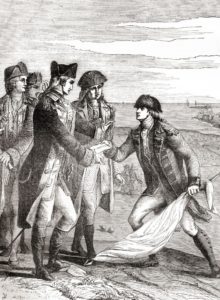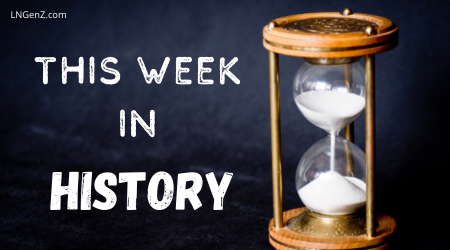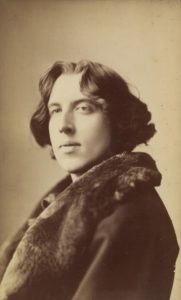-
January
-
February
- This Week in History: February 6-12 – Lesson
- This Week in History: February 6-12 – Quiz
- This Week in History: February 13-19 – Lesson
- This Week in History: February 13-19 – Quiz
- This Week in History: February 20-26 – Lesson
- This Week in History: February 20-26 – Quiz
- This Week in History: February 27-March 5 – Lesson
- This Week in History: February 27-March 5 – Quiz
-
March
- This Week in History: March 6-12 – Lesson
- This Week in History: March 6-12 – Quiz
- This Week in History: March 13-19 – Lesson
- This Week in History: March 13-19 – Quiz
- This Week in History: March 20-26 – Lesson
- This Week in History: March 20-26 – Quiz
- This Week in History: March 27-April 2 – Lesson
- This Week in History: March 27-April 2 – Quiz
-
April
- This Week in History April 3-9 – Lesson
- This Week in History April 3-9 – Quiz
- This Week in History: April 10-16 – Lesson
- This Week in History: April 10-16 – Quiz
- This Week in History: April 17-23 – Lesson
- This Week in History: April 17-23 – Quiz
- This Week in History: April 24-30 – Lesson
- This Week in History: April 24-30 – Quiz
-
May
- This Week in History: May 1 – 7 – Lesson
- This Week in History: May 1 – 7 – Quiz
- This Week in History: May 8 – 14 – Lesson
- This Week in History: May 8 – 14 – Quiz
- This Week in History: May 15 – 21 – Lesson
- This Week in History: May 15 – 21 – Quiz
- This Week in History: May 22-28 – Lesson
- This Week in History: May 22-28 – Quiz
- This Week in History: May 29-June 4 – Lesson
- This Week in History: May 29-June 4 – Quiz
-
June
- This Week in History: June 5 – 11 – Lesson
- This Week in History: June 5 – 11 – Quiz
- This Week in History: June 12-18 – Lesson
- This Week in History: June 12-18 – Quiz
- This Week in History: June 19-25 – Lesson
- This Week in History: June 19-25 – Quiz
- This Week in History: June 26 – July 2 – Lesson
- This Week in History: June 26 – July 2 – Quiz
-
July
- This Week in History: July 3 – 9 – Lesson
- This Week in History: July 3 – 9 – Quiz
- This Week in History: July 10 – 16 – Lesson
- This Week in History: July 10 – 16 – Quiz
- This Week in History July 17 – 23 – Lesson
- This Week in History July 17 – 23 – Quiz
- This Week in History – July 24-30 – Lesson
- This Week in History – July 24-30 – Quiz
- This Week in History: July 31 – August 6 – Lesson
- This Week in History: July 31 – August 6 – Quiz
-
August
- This Week in History: August 7-13 – Lesson
- This Week in History: August 7-13 – Quiz
- This Week in History: August 14 – 20 – Lesson
- This Week in History: August 14 – 20 – Quiz
- This Week in History: August 21 – 27 – Lesson
- This Week in History: August 21 – 27 – Quiz
- This Week in History: August 28 – September 3 – Lesson
- This Week in History: August 28 – September 3 – Quiz
-
September
- This Week in History: September 4 – 10 – Lesson
- This Week in History: September 4 – 10 – Quiz
- This Week in History: September 11 -17 – Lesson
- This Week in History: September 11 -17 – Quiz
- This Week in History: September 18 – 24 – Lesson
- This Week in History: September 18 – 24 – Quiz
- This Week in History: September 25 – October 1 – Lesson
- This Week in History: September 25 – October 1 – Quiz
-
October
- This Week in History: October 2-8 – Lesson
- This Week in History: October 2-8 – Quiz
- This Week in History: October 9 –15 – Lesson
- This Week in History: October 9 –15 – Quiz
- This Week in History: October 16–22 – Lesson
- This Week in History: October 16–22 – Quiz
- This Week in History: October 23–29 – Lesson
- This Week in History: October 23 –29 – Quiz
- This Week in History: October 30 – November 5 – Lesson
- This Week in History: October 30 – November 5 – Quiz
-
November
- This Week in History: November 6 – 12 – Lesson
- This Week in History: November 6 – 12 – Quiz
- This Week in History: November 13 – 19 – Lesson
- This Week in History: November 13 – 19 – Quiz
- This Week in History: November 20 – 26 – Lesson
- This Week in History: November 20 – 26 – Quiz
- This Week in History: November 27- December 3 – Lesson
- This Week in History: November 27- December 3 – Quiz
-
December
This Week in History: October 16–22 – Lesson
The British surrendered to George Washington, effectively ending the Revolutionary War.
“When I despair, I remember that all through history the way of truth and love has always won. There have been tyrants and murderers and for a time they seem invincible, but in the end, they always fall – think of it, always.” ~ Mahatma Gandhi
October 19, 1781: The British Surrender to George Washington
The Revolutionary War had been going on for about eight years as the American colonists fought to gain independence from the British. After many battles, it came down to one famous general and the surrender of his army.
The End of the Revolutionary War

(Photo by: Universal History Archive/Universal Images Group via Getty Images)
General Charles Cornwallis was a highly respected British military leader who had helped England win various battles, including an assault against General George Washington. After occupying and setting up headquarters in Yorktown, Virginia, Cornwallis worked on fortifying the area to protect it from American forces. In early October, about 17,000 troops made up of soldiers under the command of Washington and Frenchman Jean-Baptiste Rochambeau, surrounded the town. This group was known as the Franco-American army. At the same time, French Admiral Francois de Grasse had arranged his naval fleet so it could reach Yorktown via the Chesapeake Bay and the York River.
Cornwallis expected reinforcements, but the ship did not make it in time, so the general decided to surrender his nearly 8,000 men to Washington. He didn’t go to the ceremony to sign the Articles of Capitulation, saying he was sick. Instead, the defeated general sent his second in command, General Charles O’Hara, to the American and French commanders with Cornwallis’ sword as a symbol.
As the British army marched out of Yorktown in surrender, their band played The World Turned Upside Down. Although this effectively ended the Revolutionary War, small skirmishes were still happening until September 3, 1783. The Treaty of Paris officially ended the war, and America claimed its independence.
Other Notable History Mentions
October 16, 1853: The Turkish Ottoman Empire declared war on Britain, France, and Russia, starting the Crimean War. Tennyson’s poem, The Charge of the Light Brigade, describes one of the battles. During this conflict, Florence Nightingale taught sanitation processes to nurses, helping to save many lives.
October 16, 1859: Just before the Civil War started, abolitionist John Brown took over the Federal Arsenal at Harpers Ferry.
October 16, 1964: China detonated its first nuclear bomb at the Lop Nor test site.
October 16, 1978: Cardinal Karol Wojtyla of Poland became the first elected pope who was non-Italian in 456 years of popes. He changed his name to John Paul II.
October 17, 1777: British General John Burgoyne surrendered his army of 5,700 men after the Battle of Saratoga during the American Revolutionary War. This was the first big victory for the colonists.
October 17-25, 1944: During World War II, the largest naval clash in history happened during the Battle of Leyte Gulf off the Philippine Islands.
October 18, 1685: King Louis XIV of France revoked the Edict of Nantes, taking away the religious and civil liberties of Protestant Huguenots.
 October 18, 1945: The Nuremberg War Crimes Trial started. It lasted for ten months after World War II.
October 18, 1945: The Nuremberg War Crimes Trial started. It lasted for ten months after World War II.
October 19, 1987: Stocks plunged in the largest one-day drop in Wall Street history, making this day known as “Black Monday.”
October 20, 1818: The Canadian border was set at the 49th parallel by the US and Britain.
October 20, 1873: President Richard Nixon fired several people during the Watergate scandal, an event which became known as the “Saturday Night Massacre.”
October 21, 1805: The Battle of Trafalgar began between French and Spanish Fleets and the British Royal Navy. With a British victory, the threat of Napoleon’s invasion of England was stopped.
October 21, 1879: Thomas Edison tested an electric incandescent lamp and was able to keep it lit for more than 13 hours.
October 21, 1915: The American Telephone and Telegraph Company made the first transatlantic radio voice message, from Virginia to Paris.
October 21, 1967: Thousands of people protesting the Vietnam War stormed the Pentagon.
October 22, 1962: President John F. Kennedy told the American people that Russian missiles had been detected in Cuba.
Famous Birthdays

Oscar Wilde (Photo by Heritage Art/Heritage Images via Getty Images)
Noah Webster (October 16, 1758) was born in West Hartford, Connecticut. A journalist and teacher, he put together the first American dictionaries.
Oscar Wilde (October 16, 1854) was born in Dublin, Ireland. An Irish playwright and poet, he is most known for his novel The Picture of Dorian Gray and the comedy The Importance of Being Earnest.
David Ben-Gurion (October 16, 1886) was born in Plonsk, Poland. He is known as the “Father of the Nation” in Israel, which he founded in 1948.
Eugene O’Neill (October 16, 1888) was born in New York City. A playwright, he wrote more than 35 plays and received four Pulitzer Prizes. He was the first dramatist to be awarded a Nobel Prize for literature. Some of his best works include The Iceman Cometh, Long Day’s Journey into Night, and Beyond the Horizon.
Christopher Wren (October 20, 1632) was born in Wiltshire, England. A British architect, he designed St. Paul’s Cathedral as well as 52 other churches in London.
Dizzy Gillespie (October 21, 1917) was born in Cheraw, South Carolina. Born as John Birks Gillespie, he was a trumpet player and band leader, and is still considered a founding father of modern jazz.